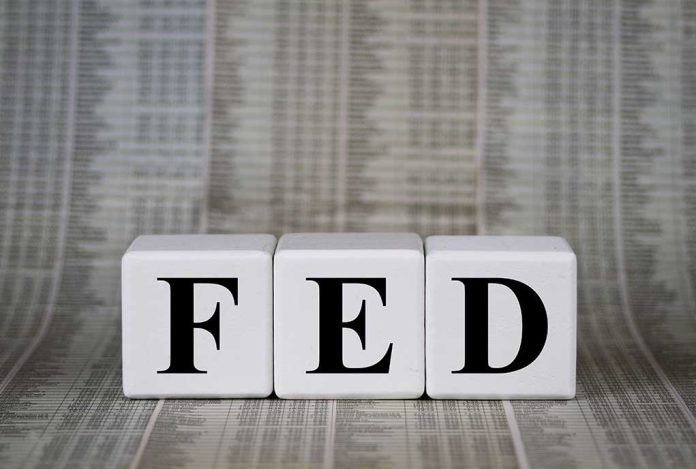
White House to begin interviewing candidates for Federal Reserve Chair this fall as Jerome Powell’s term approaches its end in 2026, raising questions about the future direction of America’s central bank.
Key Takeaways
- Treasury Secretary Scott Bessent announced the White House will start interviewing potential Federal Reserve Chair candidates this fall, well ahead of Jerome Powell’s term ending in May 2026.
- The Trump administration aims to have a six-month lead time before Powell’s departure to ensure a smooth transition.
- President Trump has publicly urged the Federal Reserve to lower interest rates but the administration has affirmed respect for the Fed’s independence.
- Discussions may soon begin about the Federal Reserve’s regulatory authority in collaboration with other banking regulators.
- Bessent reports no significant financial stability concerns following recent meetings with Powell.
Early Search Begins for Powell’s Successor
Treasury Secretary Scott Bessent revealed that the White House will commence interviews for Jerome Powell’s replacement as Federal Reserve Chair this fall, creating a substantial runway before Powell’s term expires in May 2026. Speaking from Argentina during an official visit, Bessent emphasized the administration’s desire to establish a six-month transition period before Powell’s departure. This timeline reflects the critical importance of the Federal Reserve Chair position in managing America’s monetary policy and maintaining economic stability during leadership transitions.
The early start to the selection process demonstrates the administration’s recognition of the Federal Reserve’s critical role in the economy. While the identity of potential candidates remains undisclosed, the position requires Senate confirmation and typically attracts individuals with extensive backgrounds in economics, banking, and monetary policy. The selection of Powell’s successor will likely reflect the administration’s economic priorities and vision for America’s financial future.
🇺🇸 NEW: Secretary Bessent was asked who he thinks should replace Jerome Powell as Chairman of the Federal Reserve in 2026.
Bessent: “We think about it all the time.” pic.twitter.com/FiEF4uQ0JU
— Cointelegraph (@Cointelegraph) April 14, 2025
Fed Independence and Presidential Influence
Despite President Trump’s public comments urging the Federal Reserve to lower interest rates, Bessent dismissed concerns about potential interference with the Fed’s independence. The Treasury Secretary specifically addressed questions about whether Trump might attempt to remove Powell before his term concludes, stating there was no cause for such worry. This reassurance comes against the backdrop of the President’s ongoing commentary about monetary policy.
Historically, the relationship between the Federal Reserve and presidential administrations has occasionally been marked by tension, as the central bank’s mandate to control inflation and maximize employment sometimes conflicts with political priorities. The Federal Reserve’s independence from political pressure remains a cornerstone principle of American economic policy, designed to ensure that monetary decisions are made based on economic conditions rather than political considerations.
This would be a PERFECT time for Fed Chairman Jerome Powell to cut Interest Rates. He is always “late,” but he could now change his image, and quickly. Energy prices are down, Interest Rates are down, Inflation is down, even Eggs are down 69%, and Jobs are UP, all within two…
— Donald J. Trump Posts From His Truth Social (@TrumpDailyPosts) April 4, 2025
Regulatory Authority Discussions on the Horizon
While affirming the Fed’s independence in monetary policy matters, Bessent indicated potential forthcoming discussions about the Federal Reserve’s regulatory authority. The Treasury Secretary highlighted the distinction between the Fed’s monetary policy role and its regulatory functions, noting it shares oversight responsibilities with the Office of the Comptroller of the Currency and the Federal Deposit Insurance Corporation (FDIC). These comments suggest the administration may be considering adjustments to the regulatory framework governing America’s banking system.
Bessent’s remarks point to a possible focus on the balance of power among federal banking regulators, potentially signaling a broader review of financial regulations. Any changes to the Fed’s regulatory authority would require coordination among multiple agencies and could have significant implications for how banks operate and are supervised. This approach aligns with statements the administration has made about reducing regulatory burdens while maintaining necessary oversight.
Current Economic Outlook
In his capacity as Treasury Secretary, Bessent maintains regular communication with Powell, covering a range of economic issues. Following recent meetings, Bessent characterized the current situation as “business as usual,” reporting no significant concerns regarding bond market developments or other financial stability risks that would necessitate immediate contingency planning. This assessment suggests the administration perceives relative stability in financial markets despite ongoing economic challenges.
The relationship between the Treasury Department and the Federal Reserve represents a crucial partnership in managing the nation’s economic affairs. As the search for Powell’s successor moves forward, the administration’s approach to both monetary policy and financial regulation will likely reflect its broader economic strategy, balancing growth objectives with stability concerns in an increasingly complex global economy.














